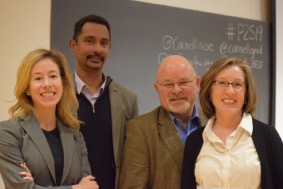Careers Leveraging Communication Skills

(in photo l to r) Rebecca Robbins, Ray Jayawardhana, Oné Pagán and Melanie Dreyer-Lude had a conversation about "Careers Leveraging Your Communication Skills".
A panel discussion moderated by Arts and Sciences Dean Ray Jayawardhana helped participants learn how to leverage their communication skills at the Pathways to Success symposium, following Science and Technology Studies Professor Bruce Lewenstein‘s plenary talk “Why you should be communicating your research to all audiences”.
Did You Miss the Panel Discussion?
Some key nuggets of advice were shared to help PhDs and postdocs better understand how to leverage the skills acquired while at Cornell and what to think about during these years that might be helpful for any future career path.
- Be open to the unexpected expressions of your profession.
- Have the courage to explore outside your comfort zone to learn new life skills–they can give you an edge in your career.
- There is value in naiveté: go for it before you know the obstacles. Take opportunities when they knock.
- Identify a gap, see a niche, and become an expert in your field.
- Follow your heart to do something that’s important to you to break the norms and create change, even if people tell you not to do it. The easy way out might seem tempting, so have the courage to try something new.
- Know the value of what you are doing, and work on communicating that. Learn to tell others what you can do.
- If you feel you are experiencing bias, ask yourself, ‘is it bias, or is it their perspective based on their experiences?’ Work to understand what’s in it for the other person/group as you communicate.
- Need first-rate research first, then add the extras. So many things come your way, doors open to you as a result of the extras that you might do outside of your research.
Successful Careers are a Combination of:
- Finding your passion (like when you feel a flutter of excitement, or find what takes up your time, what nourishes you–not necessarily what others tell you you are good at–listen to yourself!)
- Acquiring the tools (be attuned to what is right for you, your transferrable skills, and your values, like: do you love research? are you service minded? do you like to address varied questions? do you like talking with people? what kind of building do you want to be in?)
- Serendipity (good fortune, luck, taking unexpected opportunities: be prepared for them)
Advice for Skills Ph.D.s Should Think About Honing to Leverage Their Communication:
- Learn how to shorten messages (to 140 characters)
- Learn how to listen well to make decisions together, and hold other people’s hands through the decision process
- Learn project management skills, including budgets
- Know how to take the pulse of an organization, distill it from different perspectives, create actions to move a project forward, and measure how you’re doing


